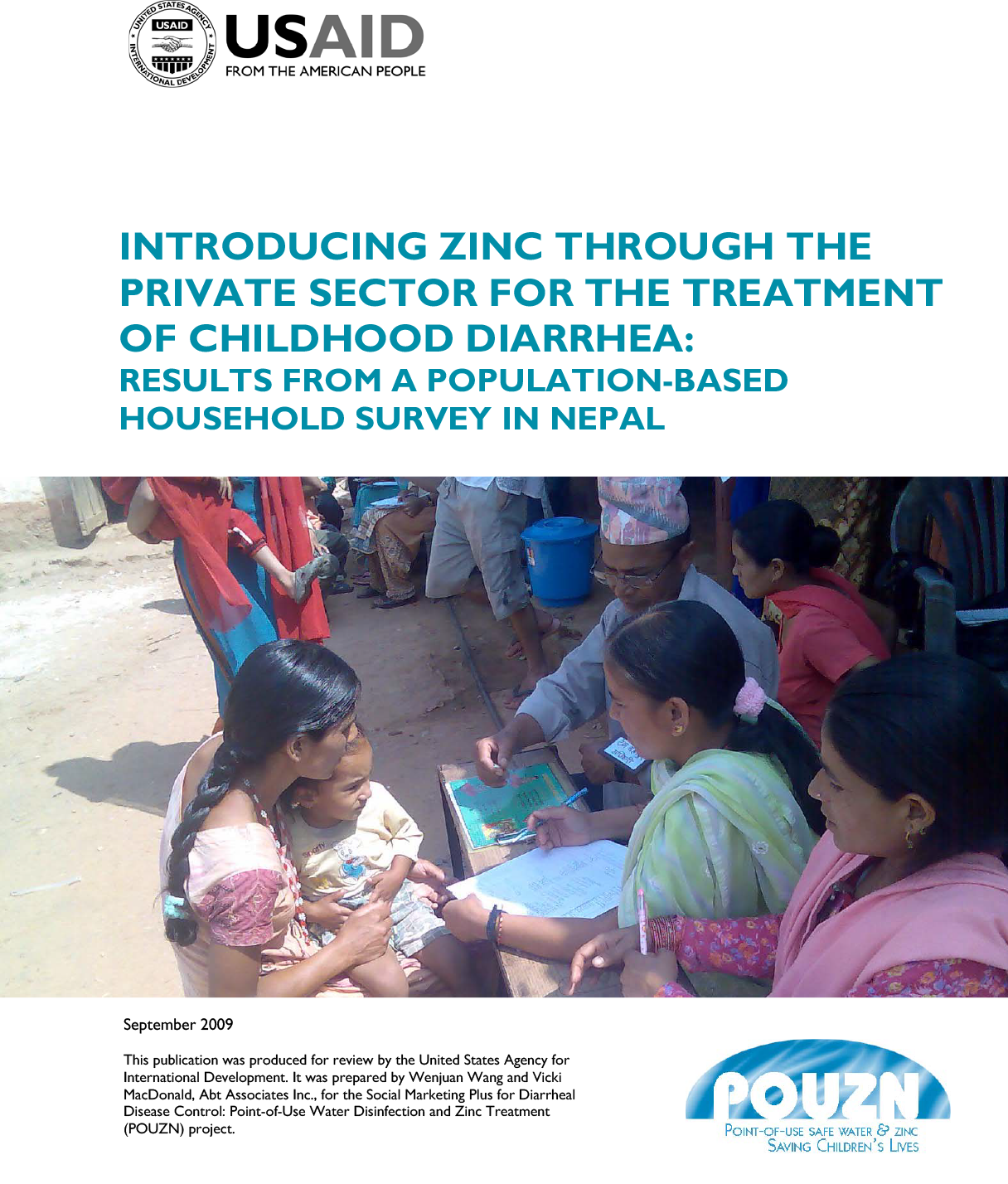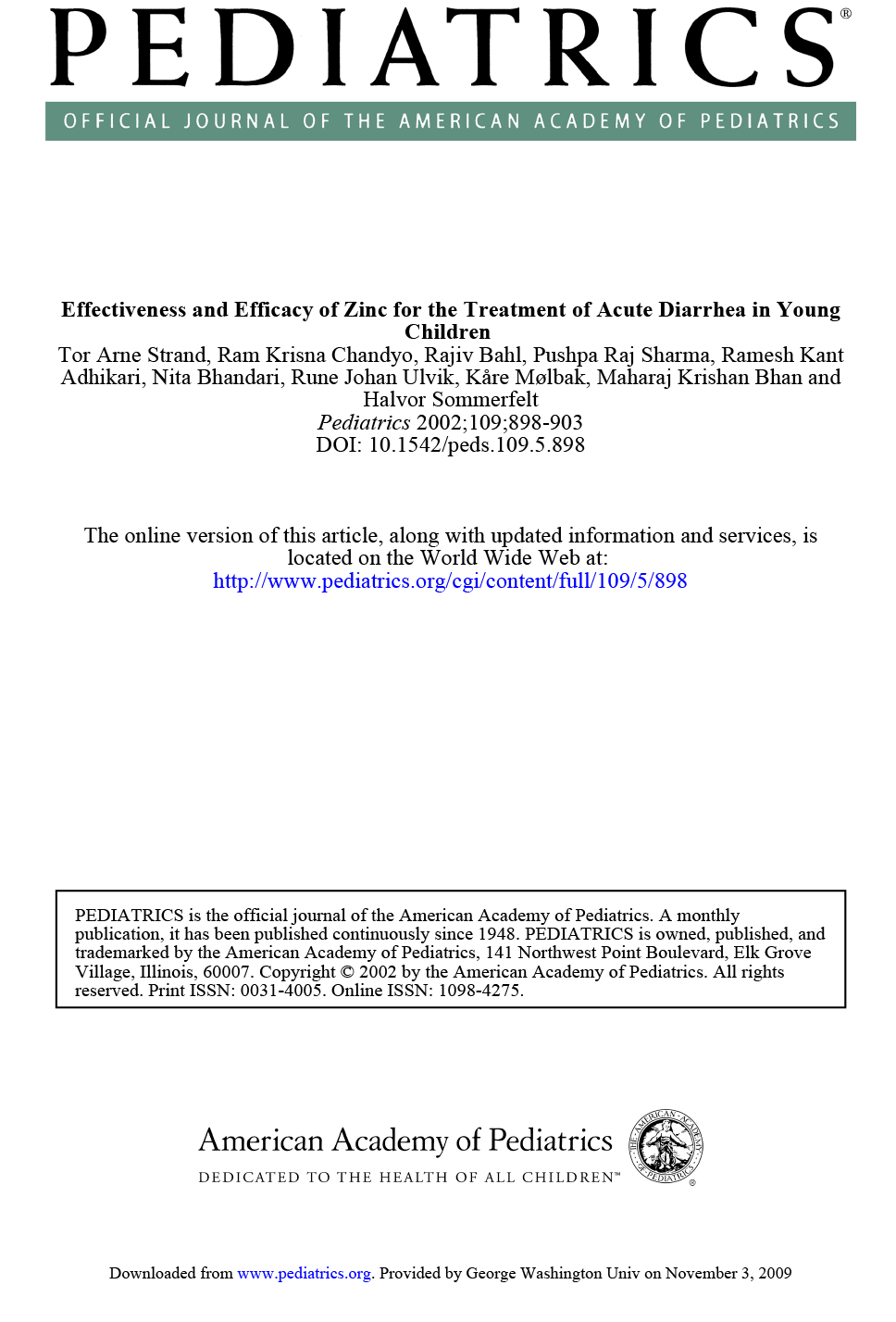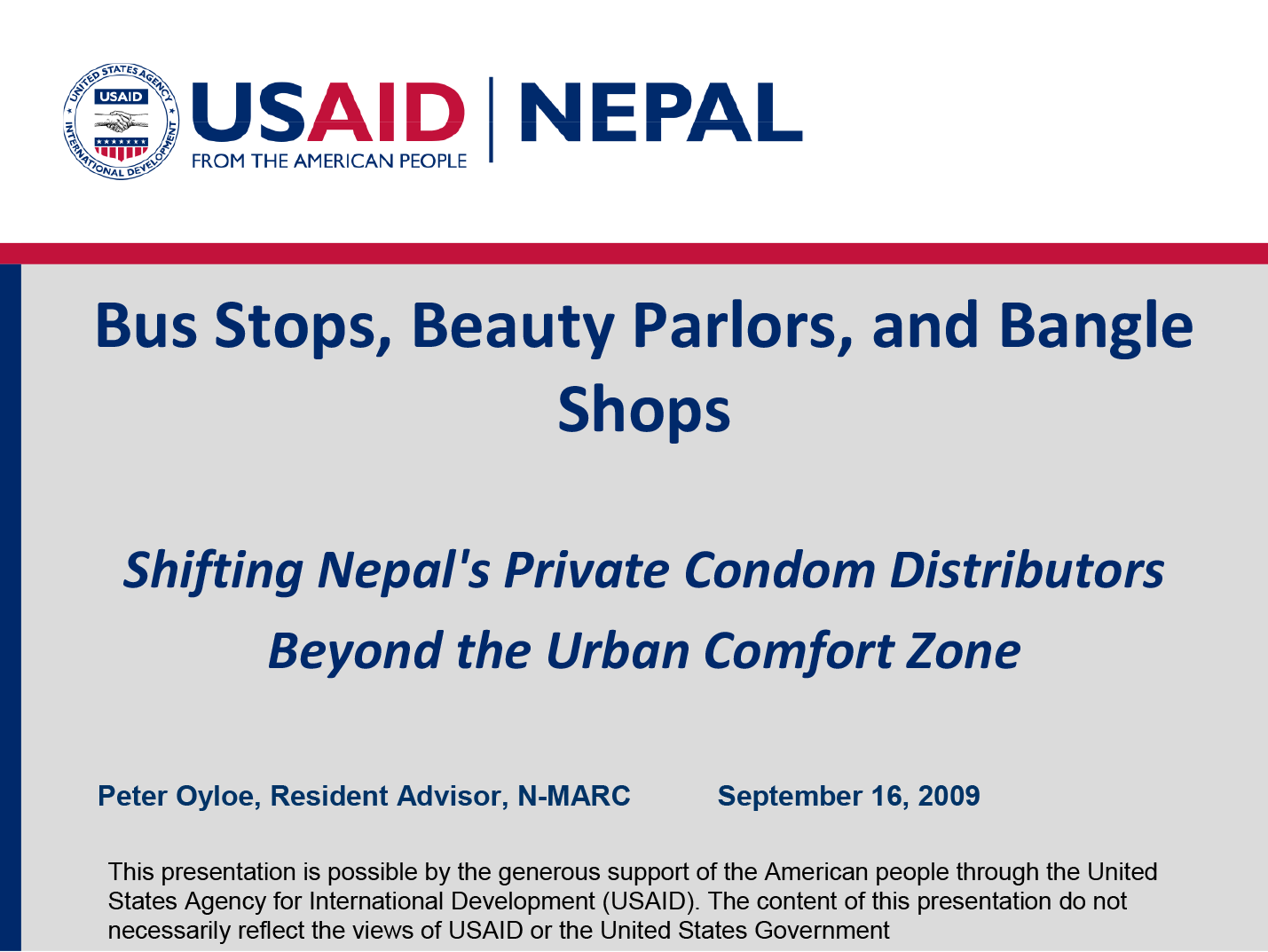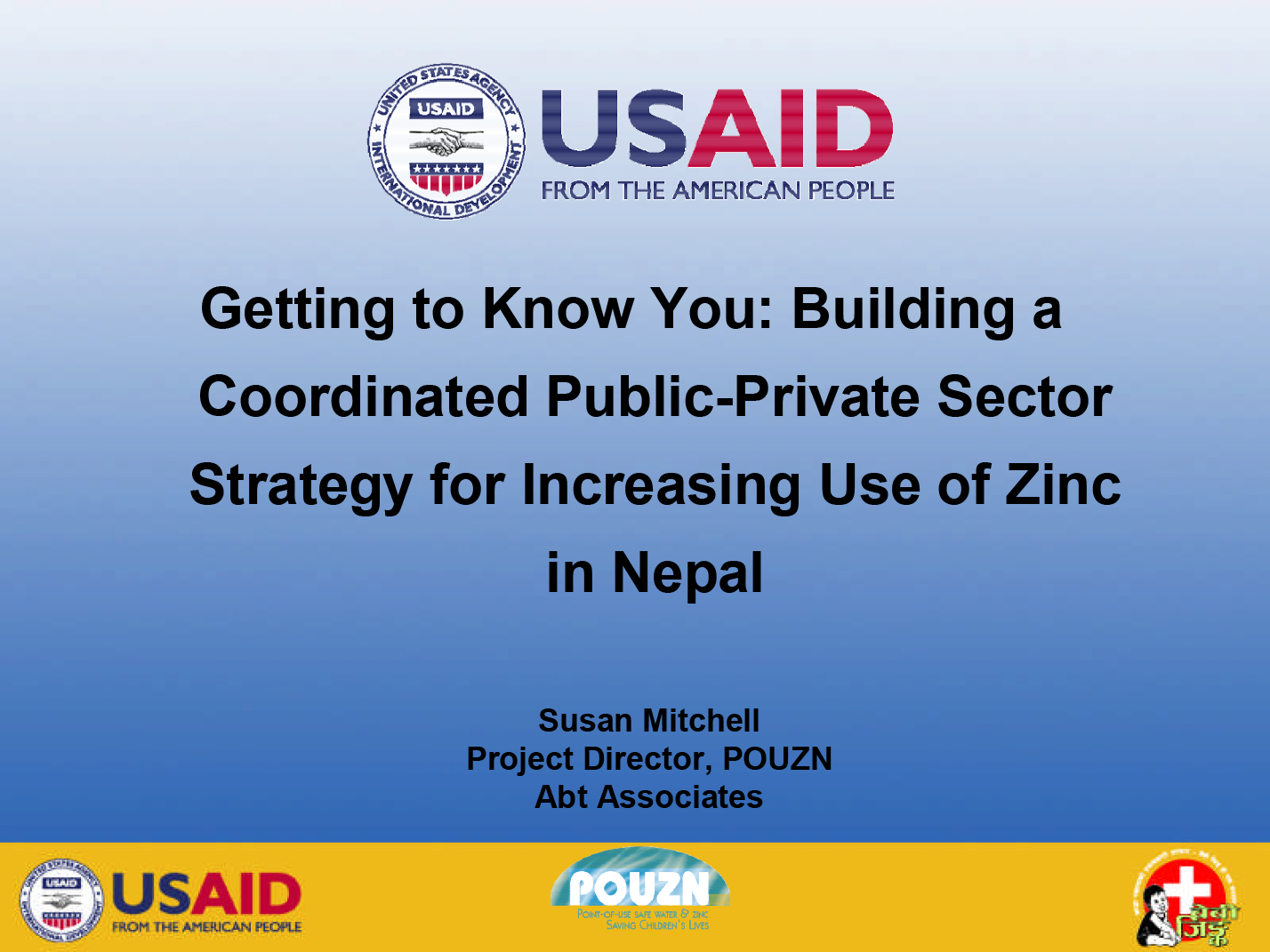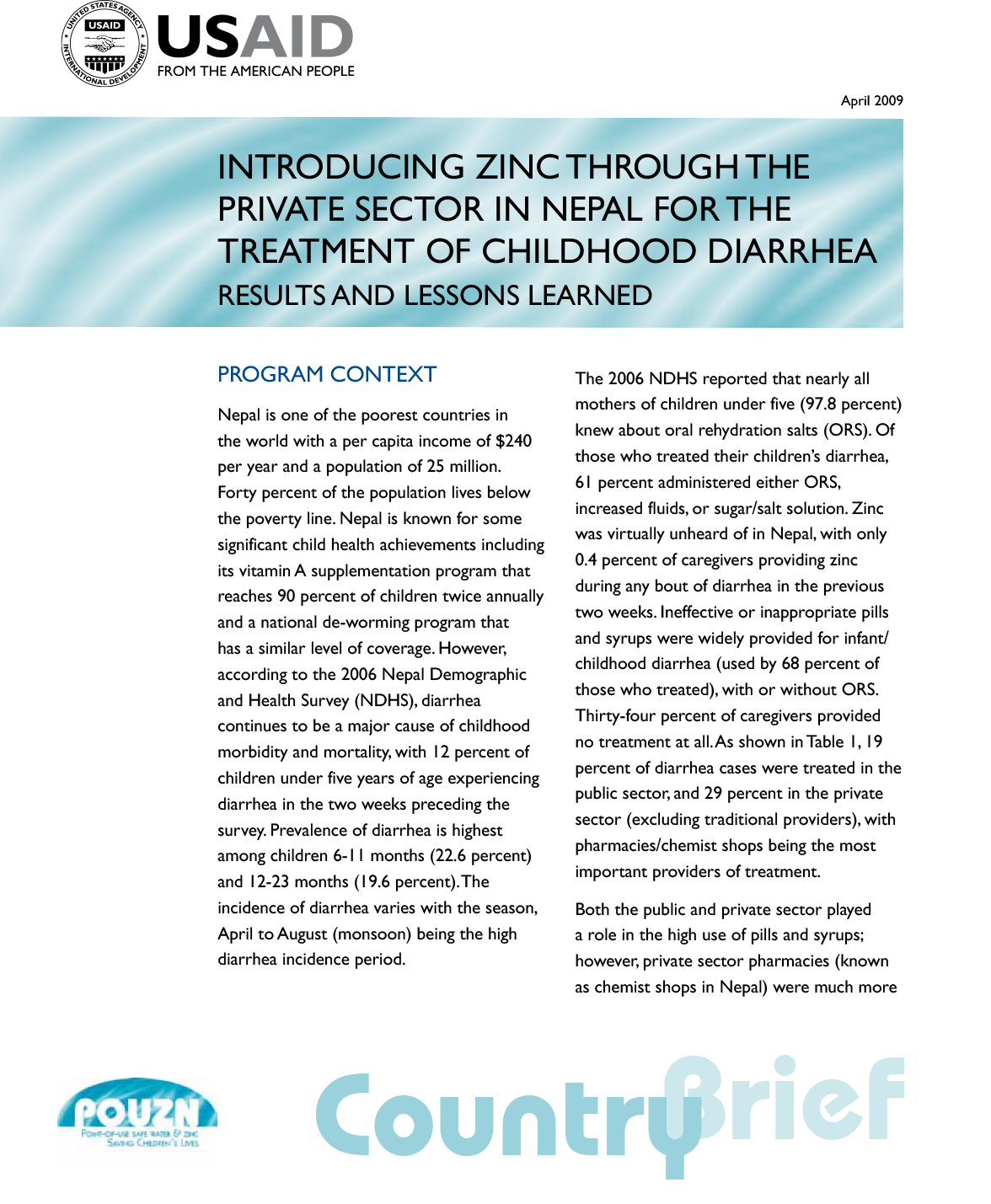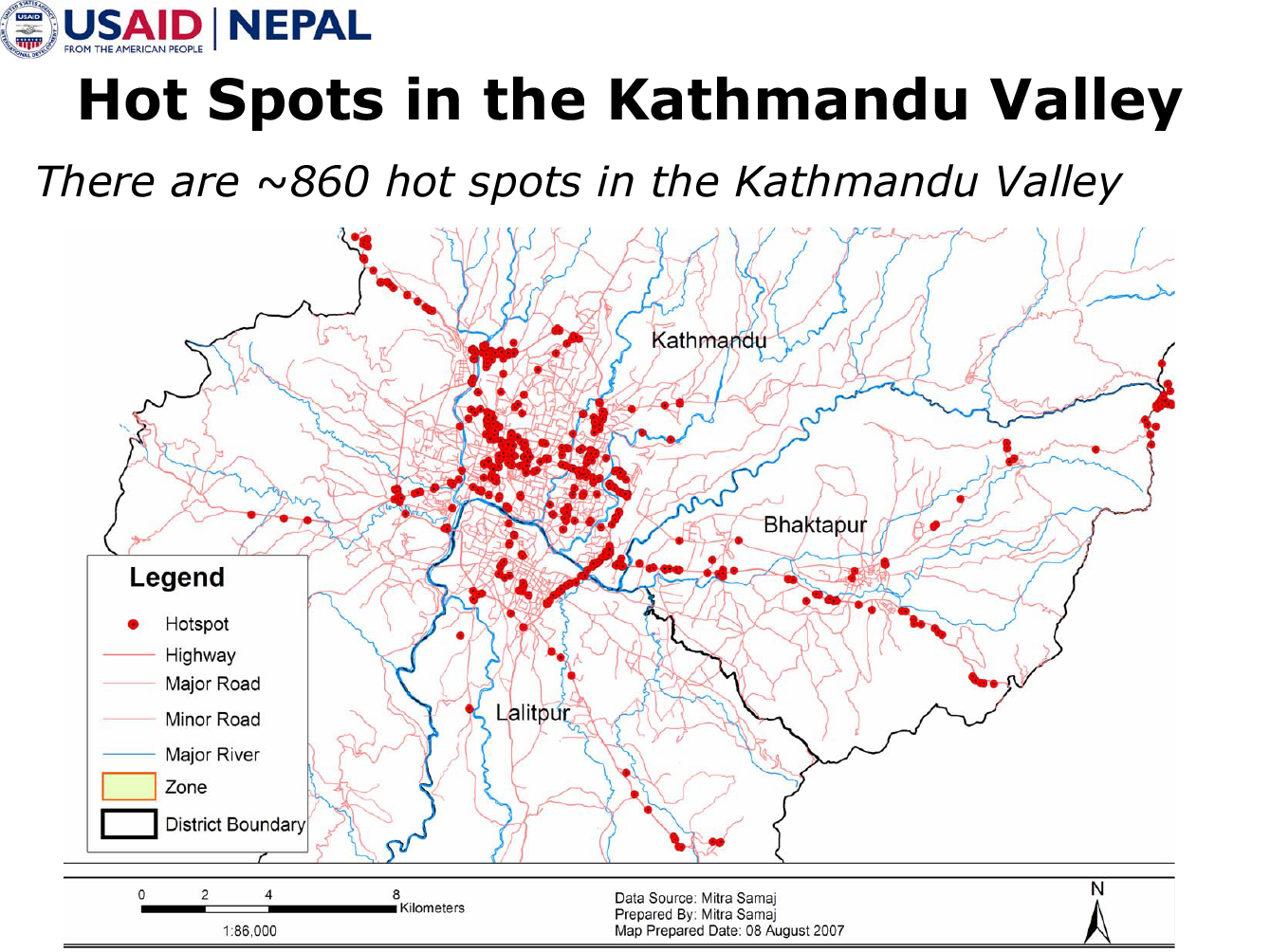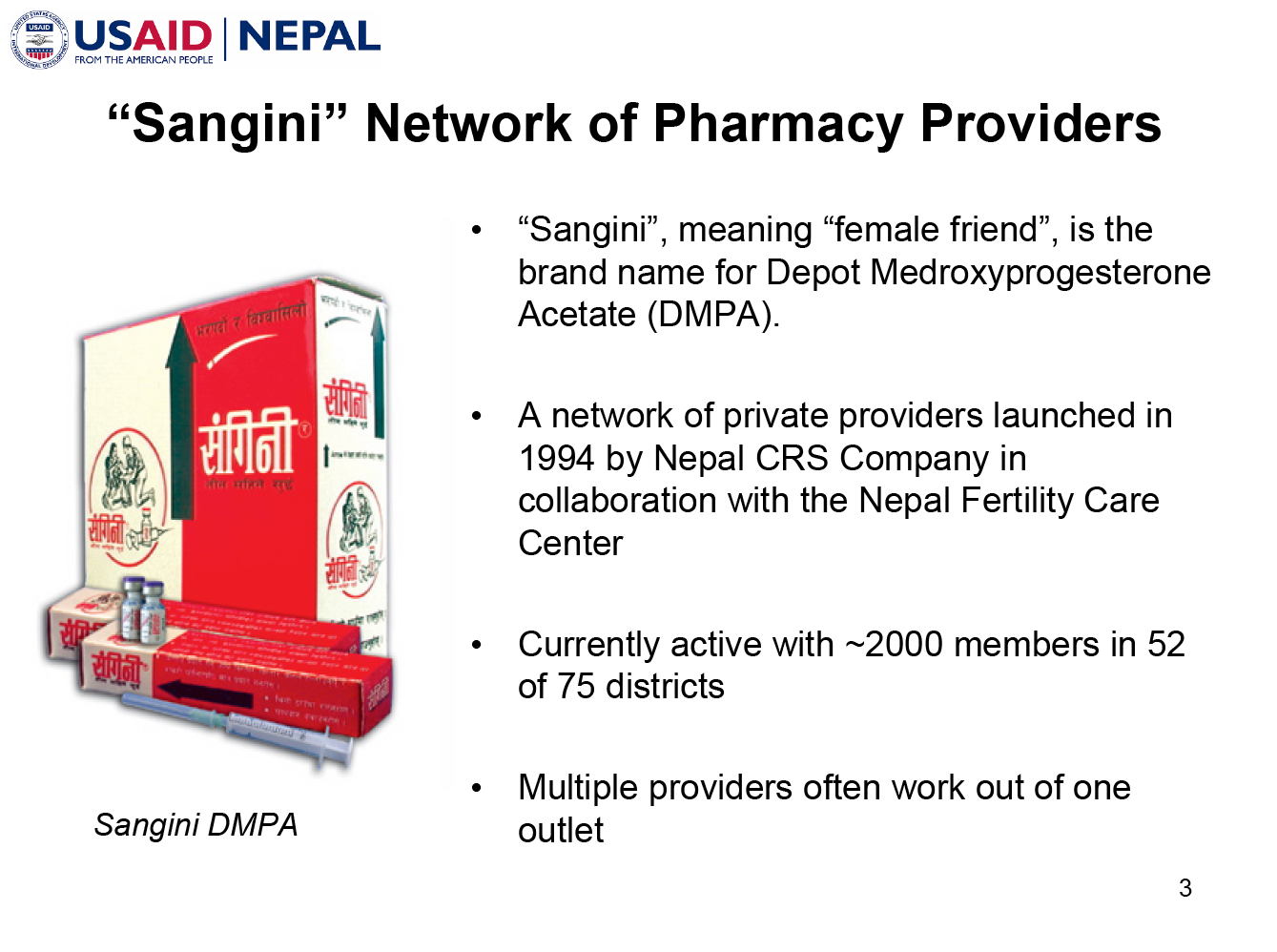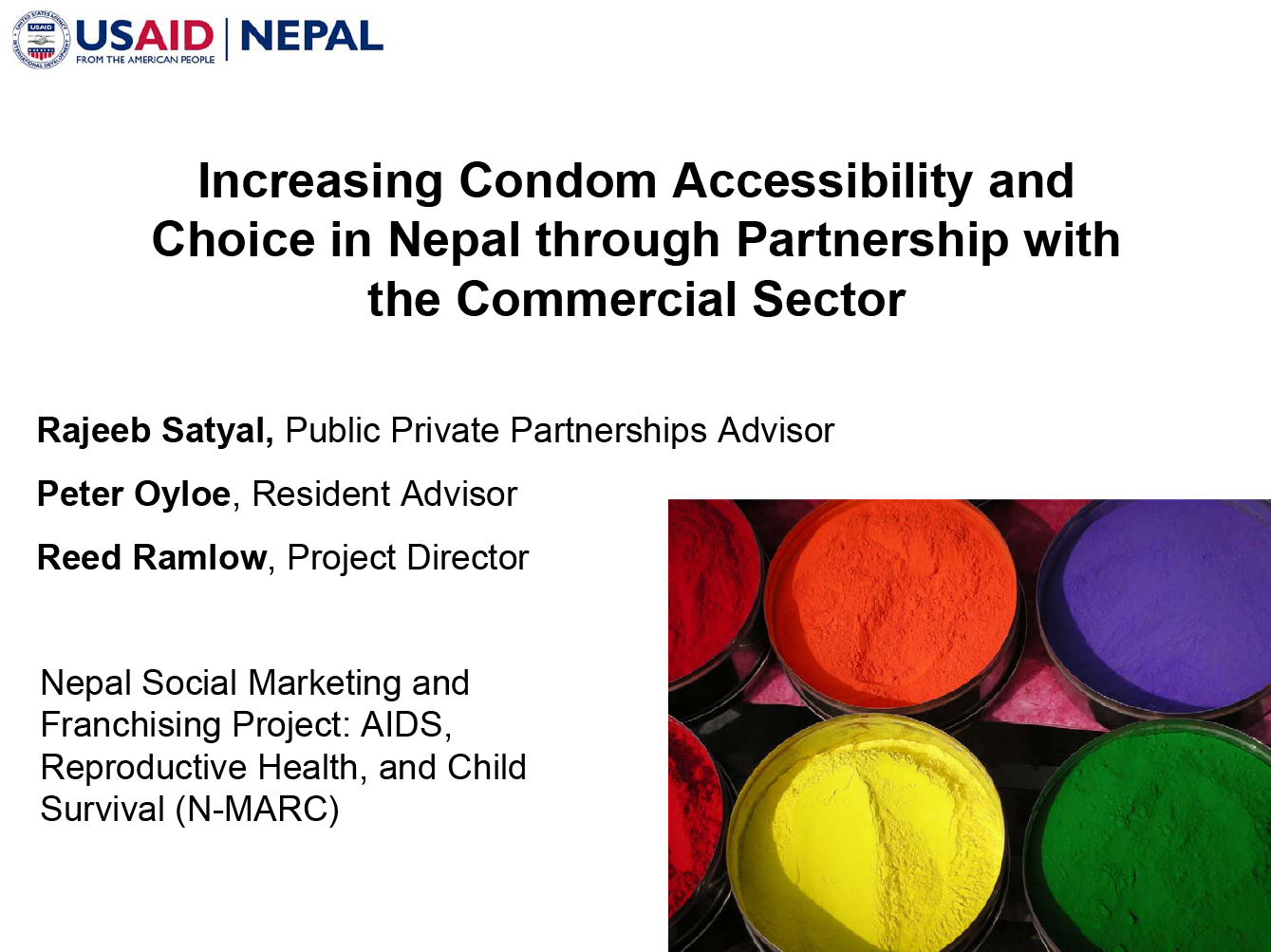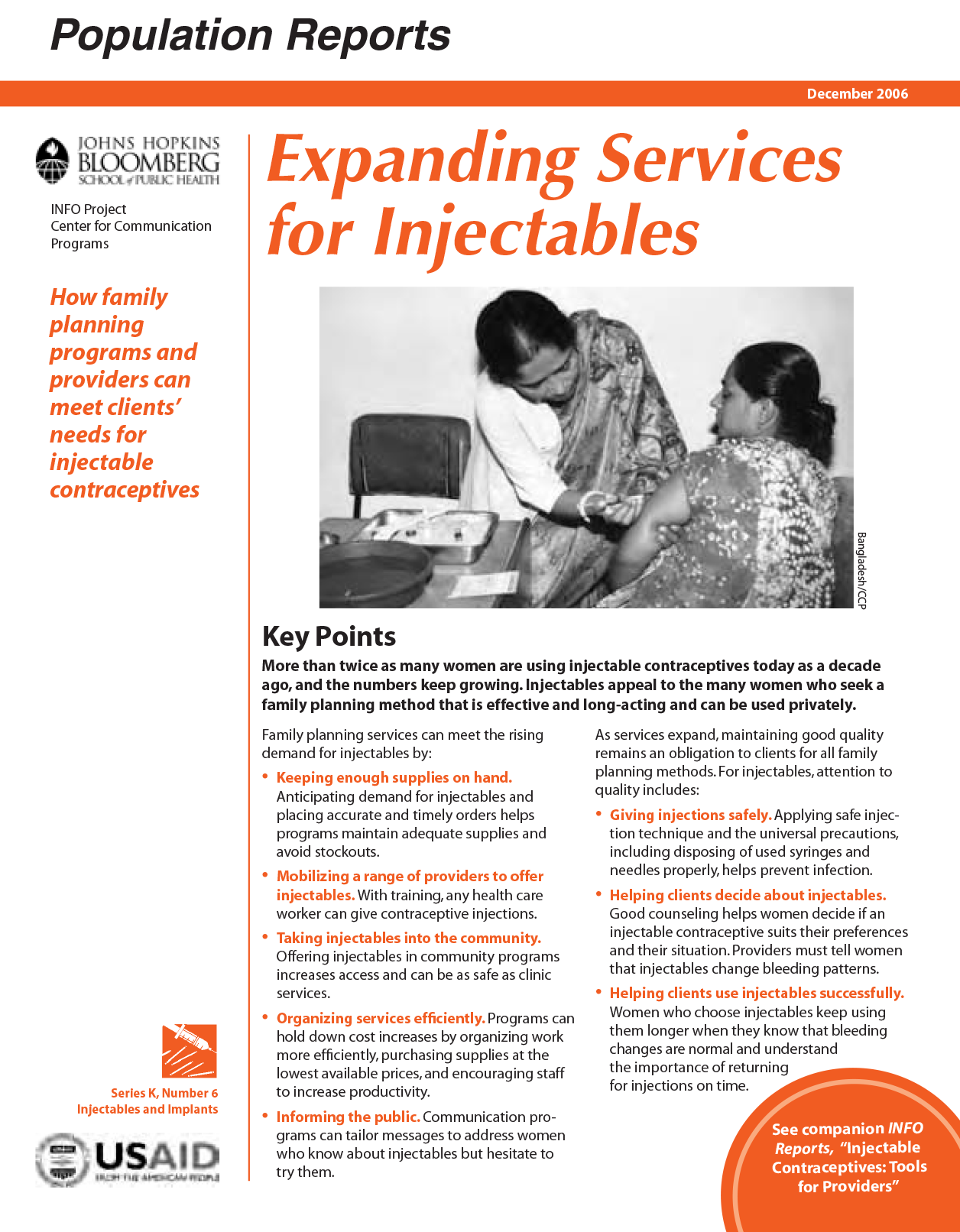
Resource Library

Nepal television TV zinc promotion
A video contributed as a resource for the SHOPS Zinc e-Conference held on June 1-2, 2011.
Resource Type : Video
Country : Nepal
Year : 2011-06-01T00:00:00
Language : English
Project : SHOPS

Resource Library
Introducing Zinc Through the Private Sector for the Treatment of Childhood Diarrhea: Results From a Population-Based Household Survey in Nepal
Every year approximately 1.7 million children die as a result of diarrhea and dehydration. In the majority of cases, these deaths are preventable, yet diarrhea remains one of the leading causes of death among children under five. In May 2004, WHO/UNICEF issued a joint statement recommending the use of zinc, an essential micronutrient for human growth, development and maintenance of the immune system, and a new formulation oral rehydration solution (ORS) with reduced levels of glucose and salt, as a twopronged approach to improved case management of acute diarrhea in children. While a few small-scale pilot programs had been implemented in limited number of countries, none had gone to scale, and the critical question remained: how does one introduce zinc treatment in different settings and ensure correct use by caregivers? The USAID-funded, Abt Associates-led Social Marketing Plus for Diarrheal Disease Control: Point-of-Use Water Disinfection and Zinc Treatment (POUZN) Project was the first project to move beyond pilot efforts into a scaled-up program with national reach in Nepal, where diarrhea is a leading cause of childhood morbidity and mortality, impacting 12 percent of the under-five population and causing 787,000 episodes and 30,000 deaths annually. The POUZN project, in collaboration with Nepal's Ministry of Health and Population, launched a pilot project in three heavily populated districts in December 2006. In April 2008, POUZN successfully expanded its program to 30 districts encompassing 50 percent of the population in Nepal and promoted zinc through innovative strategies including partnering with local manufacturers, launching a national behavior change communication campaign and training over 8,000 private sector health providers. This research study aims to assess the progress that POUZN made in improving knowledge about and the practice of using zinc, and to investigate barriers to and motivations for uptake of zinc therapy. The study findings have important implications for designing future zinc promotion programs in development settings.
Resource Type : Report
Country : Nepal
Year : 2010-01-13T12:45:00
Language : English
Project : SHOPS

Resource Library
Effectiveness and Efficacy of Zinc for the Treatment of Acute Diarrhea in Young Children
Intervention trials have shown that zinc is efficacious in treating acute diarrhea in children of developing countries. In a randomized, placebo-controlled trial, we assessed the effectiveness and efficacy of giving 3 Recommended Daily Allowances of elemental zinc to 6- to 35-month-old children with acute diarrhea. Methods. Seventeen hundred ninety-two cases of acute diarrhea in Nepalese children were randomized to 4 study groups. Three groups were blinded and the children supplemented daily by field workers with placebo syrup, zinc syrup, or zinc syrup and a massive dose of vitamin A at enrollment. The fourth group was open and the caretaker gave the children zinc syrup daily. Daywise information on morbidity was obtained by household visits every fifth day. Results. The relative hazards for termination of diarrhea were 26% (95% confidence interval [CI]: 8%, 46%), 21% (95% CI: 4%, 38%), and 19% (95% CI: 2%, 40%) higher in the zinc, zinc-vitamin A, and zinc-caretaker groups, respectively, than in the placebo group. The relative risks of prolonged diarrhea (duration >7 days) in these groups were 0.57 (95% CI: 0.38, 0.86), 0.53 (95% CI: 0.35, 0.81), and 0.55 (0.37, 0.84); zinc accordingly reduced the risk of prolonged diarrhea with 43% to 47%. Five percent and 5.1% of all syrup administrations were followed by regurgitation in the zinc and zinc-vitamin A group, respectively, whereas this occurred after only 1.3% of placebo administrations. Vomiting during diarrhea was also more common in children receiving zinc. Conclusions. Three Recommended Daily Allowances of zinc given daily by caretakers or by field workers substantially reduced the duration of diarrhea. The effect of zinc was not dependent on or enhanced by concomitant vitamin A administration.
Resource Type : Report
Country : Nepal
Year : 2009-12-16T13:45:00
Language : English
Project : SHOPS

Resource Library
Bus Stops, Beauty Parlors, and Bangle Shops: Shifting Nepal's Private Condom Traders beyond the Urban Comfort Zone
PSP-One End-of-Project Conference From Baskets to Bus Stops to Tents: Extending the Reach of the Private Health Sector
Resource Type : Presentation
Country : Nepal
Year : 2009-09-28T14:45:00
Language : English
Project : SHOPS

Resource Library
Getting to Know You: Building a Coordinated Public-Private Sector Strategy for Increasing Use of Zinc in Nepal
PSP-One End-of-Project Conference Partnerships for Family Planning and Beyond: New Takes on Traditional Market-Building Approaches
Resource Type : Presentation
Country : Nepal
Year : 2009-09-28T14:30:00
Language : English
Project : SHOPS

Resource Library
Introducing Zinc through the Private Sector in Nepal for theTreatment of Childhood Diarrhea: Results and Lessons Learned
The Government of Nepal, through the Ministry of Health and Population's (MOHP) Child Health Division, took steps to address the issue of high pill/syrup use by heavily promoting the use of both pre-packaged ORS and oral rehydration therapy (ORT)— homemade sugar/salt solutions or other recommended home fluids—to reduce the severity of symptoms from dehydration. In 2004, it became one of the first health ministries in the world to create a Zinc Task Force and prepare stakeholders for the introduction of zinc in line with the new World Health Organization (WHO)/ UNICEF recommendations for standard management of childhood diarrhea, which includes ORS/ORT along with a 10-14 day regimen of pediatric zinc.
Resource Type : Report
Country : Nepal
Year : 2009-05-12T13:45:00
Language : English
Project : SHOPS

Resource Library
GIS for Strategic Planning Coverage, Quality of Coverage and Access to Condoms in HIV Risk Zones in Nepal
Presentation by Dr. Prakash dev Pant & Ms. Manisha Shrestha, USAID/Nepal, on Social Marketing Research at the PSP-One Online Social Marketing Conference 2008.
Resource Type : Presentation
Country : Nepal
Year : 2008-04-28T16:45:00
Language : English
Project : SHOPS

Resource Library
Assessing and Improving Quality of Private Family Planning/Reproductive Health Provider Network in Nepal
Presentation by Karuna L. Shakya, QA Advisor N-MARC, EngenderHealth, Peter Oyloe, Resident Advisor, N-MARC, AED, Dr. Tina M. Vaidya, Executive President, NFCC & Dr. Mahendra P. Shrestha, Deputy Executive Director, NFCC, on Social Marketing Research at the PSP-One Online Social Marketing Conference 2008
Resource Type : Presentation
Country : Nepal
Year : 2008-04-28T16:45:00
Language : English
Project : SHOPS

Resource Library
Increasing Condom Accessibility and Choice in Nepal through Partnership with the Commercial Sector
Presentation by Rajeeb Satyal, Public Private Partnerships Advisor, Peter Oyloe, Resident Advisor & Reed Ramlow, Project Director, N-MARC Project, on Public Private Partnerships at the PSP-One Online Social Marketing Conference 2008
Resource Type : Presentation
Country : Nepal
Year : 2008-04-28T16:30:00
Language : English
Project : SHOPS

Resource Library
Expanding Services for Injectables
This report discusses the current trends in injectable use among women in developing countries. It is available for family planning program managers working to meet the increasing demand for injectables, and addresses women who would like to use such services, but either lack access or are concerned about potential side effects and/or safety implications.
Resource Type : Report
Country : Bangladesh, Cambodia, Egypt, Haiti, Indonesia, Kenya, Malawi, Namibia, Nepal, Nicaragua, South Africa
Year : 2007-02-15T10:30:00
Language : English
Project : SHOPS
Pagination
- Previous page
- Page 5
- Next page


